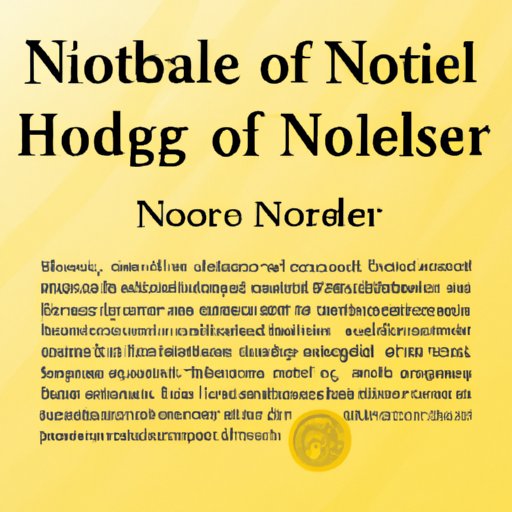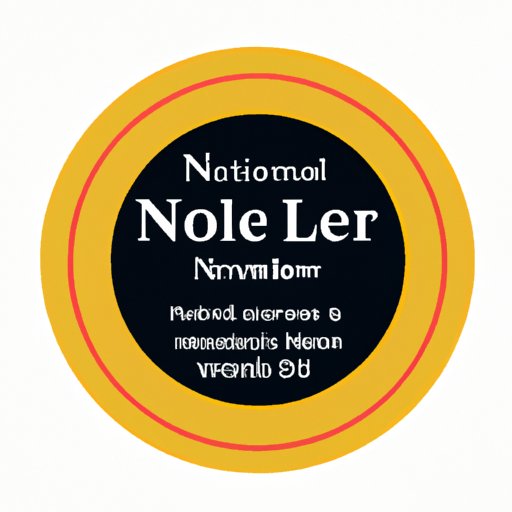Overview of the Nobel Prize for Literature
The Nobel Prize for Literature is an international award given annually since 1901 to an author who has produced “the most outstanding work of an idealistic tendency” in the field of literature. The prize is one of five Nobel Prizes established by the will of Alfred Nobel, a Swedish chemist, engineer, and philanthropist.
The Nobel Prize for Literature is awarded by the Swedish Academy, which is responsible for selecting the winner. The prize consists of a gold medal, a diploma, and a sum of money which is decided annually. The award ceremony takes place in Stockholm, Sweden, usually on December 10th, the anniversary of Alfred Nobel’s death.

History and Origins of the Nobel Prize for Literature
Alfred Nobel wrote his last will and testament in 1895, in which he stated that his fortune should be used to create a series of prizes for those who have made the greatest contributions to humanity in the fields of physics, chemistry, physiology or medicine, literature, and peace. He also stipulated that the awards should be administered by the Nobel Foundation, which was established in 1900.
The first Nobel Prize for Literature was awarded in 1901 to Sully Prudhomme, a French poet and essayist. Since then, the Nobel Prize for Literature has been awarded to 115 authors from around the world, including Toni Morrison, Gabriel García Márquez, Ernest Hemingway, and Boris Pasternak.

Criteria for Winning the Nobel Prize for Literature
In order to be eligible for the Nobel Prize for Literature, a work must meet certain criteria. It must demonstrate “idealistic tendencies” and be considered to have “the most outstanding literary merits of the highest quality.” The work can be a novel, a play, a collection of poems, or any other form of literature.
The selection process for the Nobel Prize for Literature is long and complex. Every year, the Swedish Academy appoints a Nobel Committee to select the winners of the award. The committee reviews the works submitted by members of the Academy, as well as those submitted by external experts. After careful consideration, the committee makes its recommendation to the Academy, which then makes the final decision.
Notable Winners of the Nobel Prize for Literature
Many of the winners of the Nobel Prize for Literature have become some of the most renowned authors in the world. Among them are American novelist Toni Morrison, Colombian novelist Gabriel García Márquez, American writer Ernest Hemingway, and Russian poet Boris Pasternak.
These writers were chosen for the Nobel Prize for Literature because their works demonstrate exceptional literary merit and because they embody the ideals set forth by Alfred Nobel. Their works have been praised for their insight into human nature, their ability to tell stories that move readers, and their exploration of difficult topics such as racism and war.

Impact of the Nobel Prize for Literature on World Literature
The Nobel Prize for Literature has had a significant impact on world literature. It has increased recognition of literature from countries all over the world, bringing attention to writers who might otherwise have gone unnoticed. Furthermore, it has encouraged writers to strive for excellence and has improved the overall quality of writing.
The Nobel Prize for Literature has also helped to promote global understanding by showcasing the diversity of cultures and perspectives in literature. By honoring authors from different countries, the prize has encouraged readers to explore new ideas and broaden their horizons.
The Significance of the Nobel Prize for Literature in Today’s World
The Nobel Prize for Literature continues to be an important source of recognition for authors today. It serves as an inspiration to aspiring writers and is seen as a symbol of excellence in the literary world. Its prestige and influence make it a highly sought-after award.
At the same time, the Nobel Prize for Literature is a reminder of the power of literature to promote understanding between people. By recognizing authors from different countries, it encourages us to look beyond our own cultural boundaries and appreciate the unique perspectives and ideas of others.
What the Future Holds for the Nobel Prize for Literature
The future of the Nobel Prize for Literature is uncertain. There have been calls to expand the awards to include more than one winner and to open up the selection process to a wider range of people. There have also been suggestions to change the criteria for winning the award to ensure that it is more inclusive of authors from different countries and backgrounds.
Ultimately, the Nobel Prize for Literature will continue to serve as a beacon of excellence in literature and a way to recognize the best authors in the world. As long as there are authors writing inspiring and thought-provoking works, the Nobel Prize for Literature will remain a prestigious award.
(Note: Is this article not meeting your expectations? Do you have knowledge or insights to share? Unlock new opportunities and expand your reach by joining our authors team. Click Registration to join us and share your expertise with our readers.)
